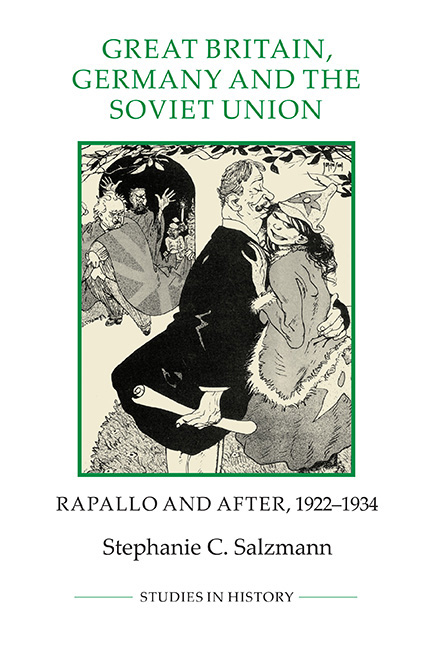Book contents
- Frontmatter
- Contents
- Acknowledgements
- Abbreviations
- Introduction
- 1 ‘It Nearly Overthrew the Applecart’: Lloyd George and the Treaty of Rapallo
- 2 ‘The Most Important Event Since the Armistice’: The Foreign Office and Rapallo
- 3 Rapallo's First Test: The Ruhr Crisis
- 4 The Policy of Conciliation: Rapallo and the First Labour Government
- 5 The Battle for the German Soul: Locarno and the Treaty of Berlin
- 6 Rapallo and the Rupture of Anglo-Soviet Relations
- 7 Rapallo and the Decline of the Locarno Spirit
- 8 An Economic Rapallo?
- 9 Rapallo and the Disarmament Conference
- 10 The Rapallo Relationship and Hitler's Rise to Power
- 11 The End of Rapallo: The German–Polish Non-Aggression Treaty
- Conclusion
- Bibliography
- Index
9 - Rapallo and the Disarmament Conference
Published online by Cambridge University Press: 29 April 2017
- Frontmatter
- Contents
- Acknowledgements
- Abbreviations
- Introduction
- 1 ‘It Nearly Overthrew the Applecart’: Lloyd George and the Treaty of Rapallo
- 2 ‘The Most Important Event Since the Armistice’: The Foreign Office and Rapallo
- 3 Rapallo's First Test: The Ruhr Crisis
- 4 The Policy of Conciliation: Rapallo and the First Labour Government
- 5 The Battle for the German Soul: Locarno and the Treaty of Berlin
- 6 Rapallo and the Rupture of Anglo-Soviet Relations
- 7 Rapallo and the Decline of the Locarno Spirit
- 8 An Economic Rapallo?
- 9 Rapallo and the Disarmament Conference
- 10 The Rapallo Relationship and Hitler's Rise to Power
- 11 The End of Rapallo: The German–Polish Non-Aggression Treaty
- Conclusion
- Bibliography
- Index
Summary
The end of the First World War left many states with feelings of deep insecurity. Germany's neighbours looked anxiously towards her as a potentially formidable military power, despite her defeat. By signing the treaty of Versailles, Berlin had to accept an extensive restructuring and curtailment in the armaments and manpower of the Reichswehr, as well as Allied supervision. The victorious powers recognised, however, that European stability did not depend solely on Germany. Rather, peace required general disarmament of victors and vanquished alike. General disarmament was therefore supposed to create a stable international order under the auspices of the League of Nations where ‘natural’ relations between states would no longer guarantee this order.
These were ideal objectives which would hardly pass the reality test. Such was the state of international uncertainty that no country was willing to contemplate disarmament as long as its own needs for security remained unsatisfied. For the time being the definition of ‘national security’ turned out to be almost always incompatible with the interests of other states. From the outset, the unbridgeable differences in the interpretation of ‘security’, and the League resolution XIV of September 1922, which inextricably linked ‘disarmament’ and ‘security’, made the likelihood of achieving international disarmament virtually impossible.
The definition of ‘security’, however, not only widened the gap between victors and vanquished, but also strained relations between Britain and France. Paris suffered from a traumatic inferiority complex vis-à-vis Germany and feared that a revitalised, revanchist Germany might once again advance onto French soil. It was clear that France would only accept disarmament once her security needs had been met in the framework of an alliance with Britain or collective security under the shelter of the League of Nations.
This French claim of security stood in stark contrast to the overriding German desire for equality in armaments. Ultimately, Germany hoped to be permitted rearmament to the Allied level again. However as long as this remained impossible, the Germans supported the concept of general disarmament down to the low level that had been imposed on them, provided they were granted securities against aggression by her militarily superior French and Polish neighbours.
- Type
- Chapter
- Information
- Great Britain, Germany and the Soviet UnionRapallo and after, 1922-1934, pp. 119 - 136Publisher: Boydell & BrewerPrint publication year: 2002



